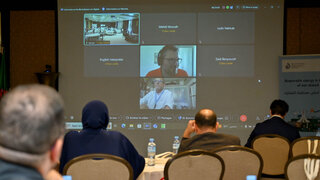Algeria Explores Electrolyzer Technologies to Power Its Green Hydrogen Future

On June 19, 2025, a high-level seminar was held in Algiers to explore the role of electrolysis technologies in Algeria’s green energy transition. Organized by the Algerian-German Energy Partnership and the H2Uppp project, in collaboration with the Ministry of Energy and Mines, the event brought together public institutions, private sector stakeholders, and international experts to discuss the development of hydrogen production and technical cooperation between Algeria and Germany.
With its vast solar and wind resources, Algeria holds tremendous potential for producing green hydrogen—a clean energy source generated by splitting water molecules into hydrogen and oxygen using electricity from renewable sources. Electrolyzers are key to this process. While hydrogen can also be produced from natural gas (commonly known as blue hydrogen), this method is primarily seen as a route for export.
The seminar focused on two main types of electrolysis technologies: PEM (Proton Exchange Membrane) and AEM (Anion Exchange Membrane) electrolyzers. PEM technology, already selected in Algeria’s national hydrogen development strategy, offers high efficiency but comes with relatively high costs due to the expensive materials involved. AEM technology, on the other hand, is newer and less widespread but shows promise for reducing costs, making it an attractive alternative for future deployment.
One of the key goals of the event was to raise awareness among Algerian stakeholders—including Sonatrach, Sonelgaz, and the Ministry of Energy—about the potential of AEM technology. Participants explored case studies, discussed technical specifications, and examined the compatibility of these systems with Algeria’s energy infrastructure.
The agenda covered a wide range of topics, starting with an overview of PEM and AEM electrolyzers, recent innovations, and their potential integration within the country. A dedicated session addressed the economic and financial aspects, including investment and operating costs, cost-reduction strategies, and available financing models. The final discussions centered on bilateral cooperation opportunities, highlighting Germany’s industry experience and the strategic role Algerian institutions can play in hydrogen technology development.
The seminar brought together key energy sector players, including the Ministries of Energy and Industry, major national companies like Sonatrach and Sonelgaz, and institutions such as CEREFE, CREG, and GEC. German technology leaders such as Siemens, Bosch, Enapter, and Neuman & Esser also contributed, alongside international hydrogen experts.
This event served as a platform to strengthen technical dialogue between Algeria and Germany, provide updated insights on PEM and AEM technologies, and identify clear pathways for launching electrolysis and hydrogen storage projects in Algeria. By fostering partnerships and knowledge-sharing, Algeria is positioning itself as a forward-thinking player in the global shift toward clean, sustainable energy.